
Hannelore Emilie Käte Grete Schroth was a German film, stage, and television actress whose career spanned over five decades.
Friedrich Schiller – The Triumph of a Genius is a 1940 German film, based on the novel Passion by Norbert Jacques. The film focuses on the early career of the German poet Friedrich Schiller.

Uncle Bräsig is a 1936 German historical comedy film directed by Erich Waschneck and starring Otto Wernicke, Heinrich Schroth and Harry Hardt. It marked the film debut of the Swedish actress Kristina Söderbaum who went on to be a major star of Nazi cinema. Söderbaum won her part in a contest organised by UFA. It was based on the 1862 novel From My Farming Days by Fritz Reuter. The film was shot at the Grunewald Studios in Berlin with sets designed by the art director Robert A. Dietrich.
Misled Youth or Youth Gone Astray is a 1929 German silent drama film directed by Richard Löwenbein and starring Fritz Alberti, Erna Morena, and Dolly Davis. It was one of a number of enlightenment films during the Weimar Era that addressed the issue of juvenile delinquency. The film's art direction was by Hans Jacoby.
His Daughter is Called Peter is a 1955 Austrian drama film directed by Gustav Fröhlich and starring Sabine Eggerth, Wolf Albach-Retty and Josef Meinrad. The film was a remake of a 1936 Austrian film of the same name. Both films were based on a novel by Edith Zellweker.

The Congress Dances is a 1955 Austrian historical musical film directed by Franz Antel and starring Johanna Matz, Rudolf Prack and Hannelore Bollmann. It is a remake of the 1930 film The Congress Dances, about a romance that takes place during the Congress of Vienna in 1814.
Emperor's Ball (German:Kaiserball) is a 1956 Austrian drama film directed by Franz Antel and starring Sonja Ziemann, Rudolf Prack and Hannelore Bollmann. The film is part of a cycle of films set during the old Austro-Hungarian Empire. It was shot in Agfacolor with sets designed by Otto Pischinger.
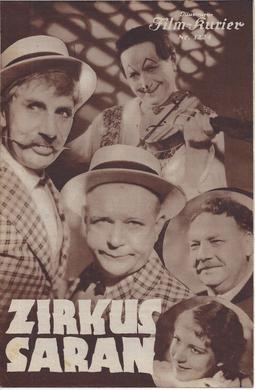
Circus Saran is a 1935 Austrian comedy film directed by E. W. Emo and starring Leo Slezak, Hans Moser, and Ole & Axel.
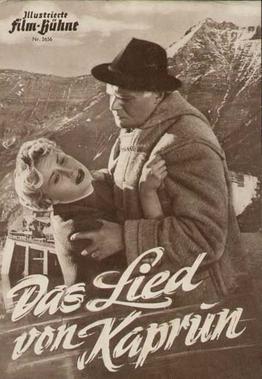
The Song of Kaprun or The Song of the Hohe Tauern is a 1955 Austrian-German drama film directed by Anton Kutter and starring Waltraut Haas, Albert Lieven and Eduard Köck. It is set in Kaprun in the High Tauern mountain range.

Seven Years of Good Luck is a 1942 German comedy film directed by Ernst Marischka and starring Wolf Albach-Retty, Theo Lingen and Hans Moser. It is a sequel to the 1940 film Seven Years Hard Luck.
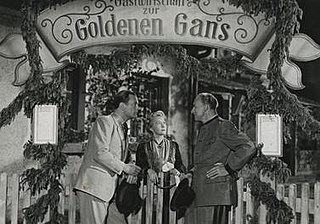
Kissing Is No Sin is a 1950 Austrian-German comedy film directed by Hubert Marischka and starring Curd Jürgens, Hans Olden and Hans Moser. The film takes its title from the waltz "Küssen ist keine Sünd" in Edmund Eysler's 1903 operetta Bruder Straubinger and features the song in its soundtrack.

At the Strasbourg is a 1934 German comedy film directed by Franz Osten and starring Hans Stüwe, Ursula Grabley, and Anna von Palen.

Grandstand for General Staff is a 1953 Austrian comedy film directed by Ernst Marischka and starring Annemarie Düringer, Adrienne Gessner and Hans Holt.

No Sin on the Alpine Pastures is a 1950 Austrian comedy film directed by Franz Antel and starring Maria Andergast, Inge Egger and Rudolf Carl.
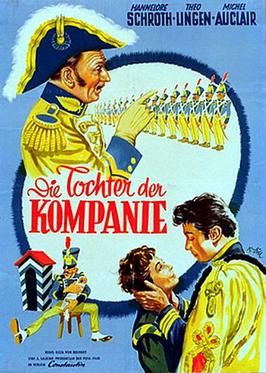
The Daughter of the Regiment is a 1953 musical comedy film directed by Géza von Bolváry and Goffredo Alessandrini and starring Antonella Lualdi, Hannelore Schroth, and Isa Barzizza. Based on the opera The Daughter of the Regiment by Gaetano Donizetti, it was made as a co-production between Italy and West Germany with separate versions released in the two languages.

Maresi is a 1948 Austrian period drama film directed by Hans Thimig and starring Attila Hörbiger, Maria Schell and Siegfried Breuer. It was one of the box offices successes of 1948.
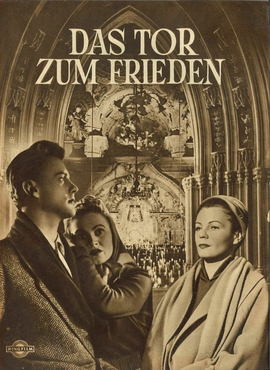
Gateway to Peace is a 1951 Austrian drama film directed by Wolfgang Liebeneiner and starring Paul Hartmann, Vilma Degischer and Hilde Krahl.
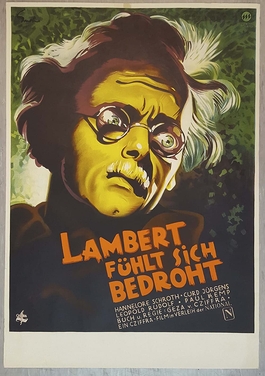
Lambert Feels Threatened is a 1949 Austrian mystery crime film directed by Géza von Cziffra and starring Hannelore Schroth, Curd Jürgens and Leopold Rudolf. The film was one of only a handful of Austrian crime films produced in the post-war era, with similarities to American and British film noirs. It was shot at the Schönbrunn Studios in Vienna and on location around Pörtschach am Wörthersee. The film's sets were designed by the art director Fritz Jüptner-Jonstorff. It was given a West German release in September 1951.
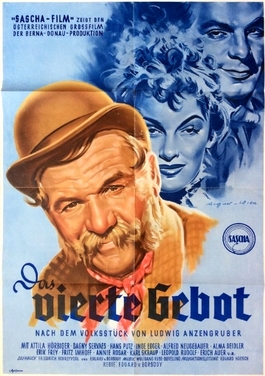
The Fourth Commandment is a 1950 Austrian historical drama film directed by Eduard von Borsody and starring Attila Hörbiger, Dagny Servaes and Inge Egger. It was shot at the Sievering Studios and on location in the Vienna Woods. The film's sets were designed by the art director Gustav Abel. It was released in West Germany the same year by Union Film. It is based in the 1878 play of the same name by Ludwig Anzengruber.
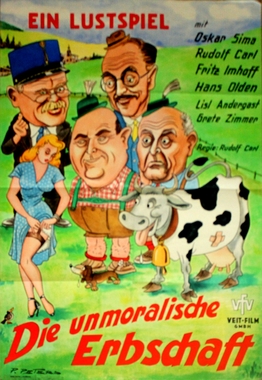
The Freckle is a 1948 Austrian romantic comedy film directed by Rudolf Carl and starring Oskar Sima, Grete Zimmer and Fritz Imhoff. The film's sets were designed by the art director Sepp Rothaur. It is also known by the alternative title The Immoral Inheritance.
















